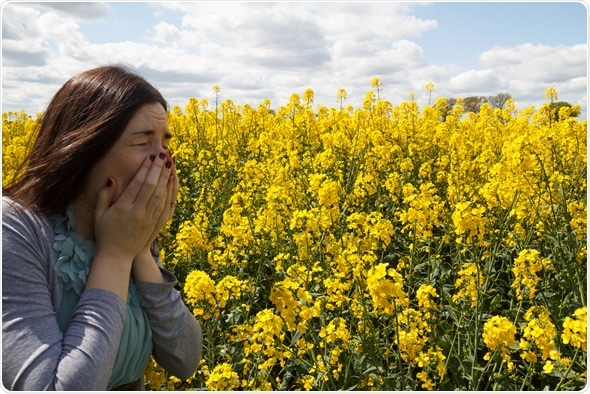Seasonal allergies, also commonly referred to as hay fever, are very common and occur due to exposure to substances in the air that are only present at certain times of the year.
Symptoms
Symptoms of season allergies primarily affect the mouth, nose and eyes and may include:
- Sneezing
- Runny nose
- Watery or reddened eyes
- Itchy mouth, nose, throat and eyes
- Coughing
- Irritability
- Difficulty sleeping
The precise presentation of the symptoms can vary considerably according to the case. Most people find that the symptoms change greatly throughout the year and are non-existent in non-trigger seasons such as winter.

Image Copyright: S J Francis, Image ID: 344266670 via Shutterstock.com
Triggers
There are various triggers that have the potential to cause allergic symptoms at certain times of the years. Pollen is a common offender that can trigger a reaction, and there are different types of pollens that present during different seasons of the year.
For example, pollen from trees such as oak, elm maple, alder, birch, juniper and olive is more prevalent in spring, and pollen from grasses such as Bermuda, timothy, orchard and thistle is most common in summer.
Each plant flowers and produces pollen at a certain time of year and each individual may have a unique susceptibility to particular triggers.
Diagnosis
A diagnosis of seasonal allergies can usually be made based on the presentation of characteristic symptoms that only develop during a particular season.
It is helpful to identify the likely allergen so that it can be avoided if possible or patients can protect themselves during the season when it is most prevalent. Skin tests can sometimes be used to help identify the causative allergen.
In some cases, the nasal discharge may be examined for the presence of eosinophils, which are a type of white blood cell that is produced more readily in an allergic reaction.
Treatment
The primary aim of treatment for seasonal allergy is to reduce the symptoms so that the patient can continue participating in daily activities as normal.
A corticosteroid nasal spray is very effective to relieve nasal symptoms and is usually recommended as a first-line option. There are few side effects associated with these sprays, although some patients may experience nosebleeds or pain in the nose.
Antihistamine medications for oral administration or in a nasal spray can also be used to manage nasal symptoms, in addition to corticosteroid spray or alone. Some patients may notice anticholinergic side effect with antihistamine medications, such as sleepiness, dry mouth or blurred vision.
It is also common to use a decongestant medication (e.g. pseudoephedrine or phenylephrine) to relieve nasal congestion. There are several combination products on the market that contain both an antihistamine and a decongestant medication.
Other medications that are sometimes used in the treatment of seasonal allergy include cromolyn, azelastine and montelukast.
Allergen immunotherapy, also known as desensitization, can be used for some patients if the symptoms are severe, the allergen is unavoidable, medications do not provide adequate relief or symptoms of asthma develop. This usually begins after the pollen season in preparation for the next season, with the aim to reduce the sensitivity to the allergen.
Self-Care
Many patients find that their seasonal allergy symptoms tend to improve with sinus irrigation. This is a technique that involves flushing out the sinuses with a warm saline solution to remove mucus and congestion. Similarly, eye washes or artificial tears can help to reduce irritation in the eyes.
References
Further Reading
Last Updated: Feb 26, 2019